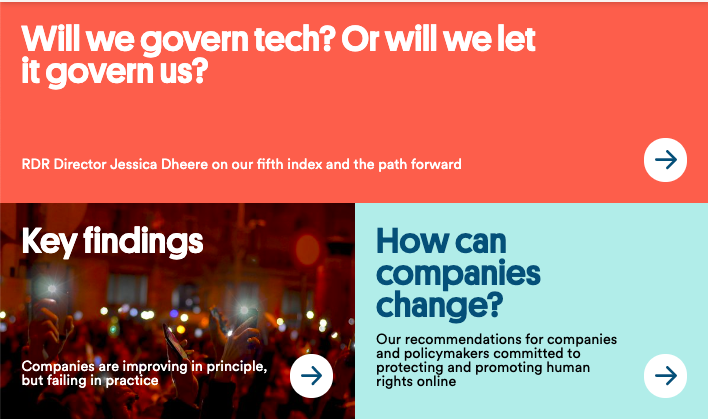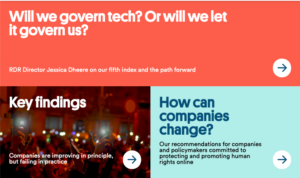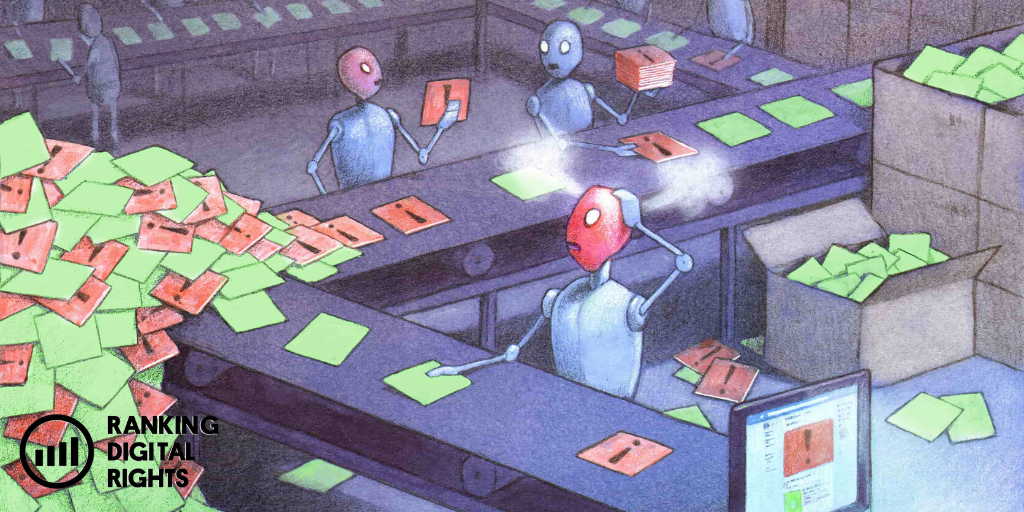
London protest. Photo by G. Miessi, licensed for reuse (CC BY-NC-ND 2.0)
This is the RADAR, Ranking Digital Rights’ bi-monthly newsletter. This edition was sent on December 10, 2020. Subscribe here to get The RADAR by email.
In 2020, we’re marking International Human Rights Day by looking back on a very special protest chant. It went like this: “Fuck the algorithm! Fuck the algorithm!”
Last August, this was the refrain among students and parents gathered outside the U.K. Department for Education in London to voice their anger over a government decision to issue end-of-year secondary school grades using an algorithm, after students were unable to sit for final exams due to the COVID-19 pandemic. When Ofqual, the government department that regulates qualifications and exams in England, published the data behind the algorithm, it was plain to see that it carried a bias against high-performing students at schools with historically lower test scores, thereby reducing these students’ prospects for university admission.
This loud and certain public response, and its keen focus on the algorithm itself, signals an inflection point in public awareness of the potential harms of technologies that try to predict who we are and what we want. Digital rights advocates, technologists, and researchers are no longer the only people who understand the problems that arise when our rights are determined (or denied) by technologies that are built without basic measures of accountability to the public. The people most affected by these technologies have raised their voices in 2020, and they have been heard.
While students in the U.K shouted “fuck the algorithm,” Black Lives Matter protesters in the U.S. demanded that local governments suspend their use of facial recognition technologies—including software built by two companies we rank, Amazon and Microsoft. Although researchers showed compelling evidence in 2019 that Amazon’s Rekognition software wrongly identified women and people with dark skin at alarmingly high rates, it wasn’t until this summer’s Black Lives Matter protests that Amazon, alongside Microsoft and IBM, vowed to stop selling this software to law enforcement, at least temporarily. And despite the specter of COVID-19, people around the world are wary of contact-tracing apps, in many cases deciding that their privacy rights are not worth trading for the unproven promises of these move-fast solutions.
As we look back at big wins and losses for human rights in 2020, this feels like something to celebrate. Tech companies can no longer operate without worrying about how their actions will be judged by the public. The barriers that have guarded against public scrutiny of new technologies seem to be crumbling.
In our work at RDR, we see evidence of this in several places. Facebook’s long-awaited Oversight Board finally launched and the group announced its first set of cases for review just last week. A few days later, Twitter posted an open call for comments on its process for assigning “verified” status to high-profile users—we tweeted a few thoughts on this. And two leading companies in the RDR Index, MTN and Yandex, released transparency reports for the very first time.

Transparency graphic by Access Now, licensed for reuse (CC BY 4.0)
‘Tis the season for transparency?
South African telco MTN’s report came on the heels of an open letter to new CEO Ralph Mupita, written by Access Now and signed by allies including RDR, pushing for the company to adopt stronger human rights practices. In a blog post for Access Now, Isedua Oribhabor and Berhan Taye called the report a milestone, but pointed to many more steps MTN can take to truly champion transparency.
Russian tech giant Yandex also released its first transparency report in late October. RDRʼs company engagement lead, Jan Rydzak, acknowledged the move, but said the company still has a long way to go to better safeguard and respect users’ human rights
Apple responded to our open letter!
Apple’s global head of privacy, Jane Horvath, responded to our call for the company to implement critical privacy protections and also took an unprecedented swipe at Facebook’s ad-targeting practices. In our October letter to Apple CEO Tim Cook, signed by several partners, including Amnesty International, Human Rights Watch, and the Electronic Frontier Foundation, we urged Apple to implement long-awaited anti-tracking measures initially promised as part of iOS 14 and later delayed to 2021. As noted in our letter, this move left many users vulnerable to surveillance and harmful disinformation during the ongoing COVID-19 pandemic and in the critical weeks leading up to the 2020 U.S. election.
In her response, Horvath offered a detailed breakdown of the different layers of privacy and data collection that can occur in the mobile ecosystem and acknowledged that “tracking can be invasive and even creepy.” She also took Facebook executives to task, saying that they “have made clear that their intent is to collect as much data as possible across both first and third party products to develop and monetize detailed profiles of their users…”
This letter is a big win for the RDR team as we continue to push companies including both Apple and Facebook to be accountable to users across the globe and uphold the universal right to privacy. Read more about our letter and Apple’s response in the Guardian, Yahoo Finance, Bloomberg, and Fast Company.
COMING SOON: THE 2020 RDR INDEX!
Mark your calendar: The next RDR Corporate Accountability Index will launch on February 24, 2021! For the first time, we’ll be ranking companies on what they say publicly about how they build and use algorithms and ad-targeting systems. And we’ll be adding two new companies to our roster, Amazon and Alibaba. Read more about the forthcoming RDR Index
Evaluating Iranian chat apps with RDR’s methodology
Our rankings inform research and advocacy all around the world and our methodology is public—so anyone can use it! At a virtual event last month, our colleagues at Taraaz and Filterwatch used our methodology to analyze popular local messaging apps in Iran and evaluate their companies’ commitments to privacy and freedom of expression. At a recent virtual event hosted by Small Media, RDR Research Analyst Afef Abrougui and RDR Director Jessica Dheere discussed the findings with lead researchers Roya Pakzad and Melody Kazemi along with Kaveh Azarhoosh and UC Irvine’s David Kaye.
Learn about our other partnerships, or reach out to info@rankingdigitalrights.org if you’d like to talk with us about using our methodology!

Watch: Replay of Digital Rights & Technology Sector Accountability in Iran hosted by Filterwatch and Taraaz.
Pings: RDR events and activities in brief
Global Conference for Media Freedom: RDR Director Jessica Dheere moderated a star-studded panel, including Estonian Foreign Affairs Minister Urmas Reinsalu, UN Special Rapporteur on the promotion and protection of the right to freedom of expression and opinion Irene Khan, Folha de S. Paulo journalist Patrícia Campos Mello, Internet Sans Frontieres’ Julie Owono, BuzzFeed’s Craig Silverman, and Facebook’s Miranda Sissons. Watch the replay.
Bread and Net 2020nline: RDR Research Analyst Afef Abrougui spoke with Wafaa Heikal on how digital rights organizations in the Arab region can keep large tech companies—namely Etisalat and Ooredoo, both of which we evaluate—accountable to their users.
IGF 2020: RDR Editorial Director Ellery Biddle kicked off RDRʼs participation in the IGF with a session of the Dynamic Coalition on the Sustainability of Journalism and News Media, presenting key findings from our It’s the Business Model report series. Later in the program, RDR researchers Afef Abrougui and Jan Rydzak co-led a very 2020 session on how companies respond to crisis.
The Scan: What we’re reading (and buying)
-
-
- The Algorithm: In this weekly newsletter, MIT Technology Review reporter Karen Hao digs into the world of AI and sheds light on the opaque systems that drive so much of the technology we use every day. With expert interviews, must-reads, and even some memes, this is one way we’re keeping an eye on AI 👀.
- How to tackle social media regulation without chilling free speech: RDR Founding Director, Rebecca MacKinnon, shares recommendations for the Biden administration in an op ed for Slate. She draws from a paper published as part of a fellowship with the University of California National Center for Free Speech and Civic Engagement.
- Privacy not included: As we gear up for a holiday season that is sure to be dominated by virtual gifts of all kinds, we’re throwing kudos to our friends at Mozilla, who just released a shiny new privacy and digital rights gift-buying guide, redefining what it means to hang stockings by the chimney with care.
From the RDR team, we wish you a restful and safe end of 2020! You’ll find us back in your inbox on February 18 with a sneak peek at our 2020 RDR Corporate Accountability Index. Until then, keep an eye on our latest ideas and activities on Twitter
Put us on your radar! Subscribe to The RADAR to receive our newsletter by email.









